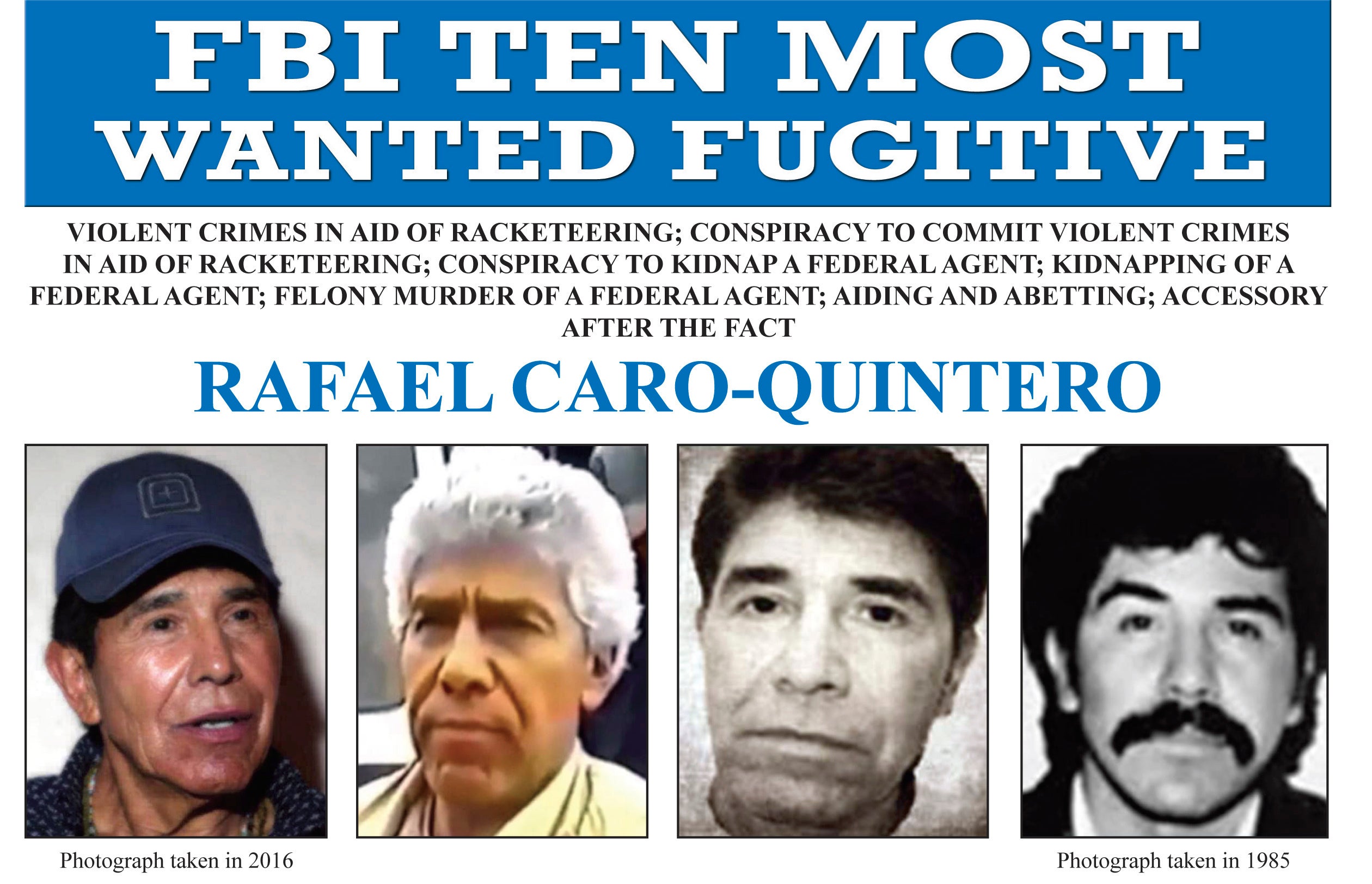Mexico's capture of drug kingpin could be signal to US
Mexican marines were closing in on infamous drug lord Rafael Caro Quintero deep in the mountains of his native state of Sinaloa

Your support helps us to tell the story
From reproductive rights to climate change to Big Tech, The Independent is on the ground when the story is developing. Whether it's investigating the financials of Elon Musk's pro-Trump PAC or producing our latest documentary, 'The A Word', which shines a light on the American women fighting for reproductive rights, we know how important it is to parse out the facts from the messaging.
At such a critical moment in US history, we need reporters on the ground. Your donation allows us to keep sending journalists to speak to both sides of the story.
The Independent is trusted by Americans across the entire political spectrum. And unlike many other quality news outlets, we choose not to lock Americans out of our reporting and analysis with paywalls. We believe quality journalism should be available to everyone, paid for by those who can afford it.
Your support makes all the difference.As Mexican marines closed in on infamous drug lord Rafael Caro Quintero deep in the mountains of his native state of Sinaloa, it was a 6-year-old bloodhound named “Max” who rousted from the undergrowth the man allegedly responsible for the murder of a U.S. DEA agent more than three decades ago.
While the United States’ motivation to find Caro Quintero was never in doubt — hence the $20 million reward for information leading to his capture — there was less certainty about the commitment of Mexican President Andrés Manuel López Obrador, who had made clear his disinterest in pursuing drug lords.
Yet on Friday, three days after López Obrador and U.S. President Joe Biden met in the White House, the most wanted target of the U.S. Drug Enforcement Administration was in Mexican custody.
Mexico’s Attorney General’s Office said in a statement late Friday that Caro Quintero was arrested for extradition to the U.S. and he would be held at the maximum security Altiplano prison about 50 miles west of Mexico City.
“It seems to me that in the private talks between President Joe Biden and Andrés Manuel (López Obrador) they surely agreed to turning over high-profile drug traffickers again, which had been suspended,” said security analyst David Saucedo.
Cooperation between the DEA and Mexico’s marines had led to some of the highest-profile captures during previous administrations, but not under López Obrador, Saucedo noted.
Both presidents face domestic pressure to do more against drug traffickers. With Caro Quintero’s arrest, “Narcos are being captured again and I believe that clearly it was what was in fact needed,” Saucedo said.
Samuel González, who founded the organized crime office in Mexico’s Attorney General’s Office and now a security analyst, said that to López Obrador's benefit, the arrest “shows evidence that there’s no protection of capos” from his administration.
González believes Caro Quintero has long been a thorn in the bilateral relationship, but said that “without doubt” his capture was fruit of the recent negotiations in Washington.
U.S. Attorney General Merrick Garland and U.S. Ambassador to Mexico Ken Salazar both expressed gratitude for Mexico’s efforts to catch the man blamed for the brutal torture and murder of DEA agent Enrique “Kiki” Camarena in 1985 — a case that brought a low point in U.S.-Mexico relations.
“This achievement is a testament to Mexico’s determination to bring to justice someone who terrorized and destabilized Mexico during his time in the Guadalajara Cartel; and is implicated in the kidnapping, torture, and murder of DEA agent Kiki Camarena,” Salazar said in a statement late Friday.
Garland said the U.S. government would seek his immediate extradition.
Mexico’s navy and Attorney’s General Office led the operation deep in the moutains that straddle the border between Sinaloa and Chihuahua states, many miles from any paved road. They found Caro Quintero, with help of “Max,” hiding in brush in a place in Sinaloa called San Simon.
Caro Quintero came from Badiraguato, Sinaloa, the same township as Joaquin “El Chapo” Guzman, the former leader of the Sinaloa cartel, which came later. Caro Quintero was one of the founders of the Guadalajara cartel and according to the DEA was one of the primary suppliers of heroin, cocaine and marijuana to the United States in the late 1970s.
He blamed Camarena for a raid on a huge marijuana plantation in 1984. The next year, Camarena was kidnapped in Guadalajara, allegedly on orders from Caro Quintero. His tortured body was found a month later.
Caro Quintero was serving a 40-year sentence in Mexico when an appeals court overturned his verdict in 2013. The Supreme Court upheld the sentence, but it was too late — Caro Quintero had been spirited off in a waiting vehicle.
Caro Quintero was added to FBI’s 10 most wanted list in 2018 with a $20 million reward for his capture.
López Obrador had previously seemed ambivalent about his case.
Last year, the president said the legal appeal that led to Caro Quintero’s release was “justified” because supposedly no verdict had been handed down against the drug lord after 27 years in jail. López Obrador also depicted a later warrant for his re-arrest as an example of U.S. pressure.
“Once he was out, they had to look for him again, because the United States demanded he shouldn’t have been released, but legally the appeal was justified,” López Obrador said.
Presidential spokesman Jesús Ramírez said at the time, “The president was just saying that it was a legal aberration that the judge had not issued a verdict on Mr. Caro Quintero after 27 years ... but he was not defending his release.”